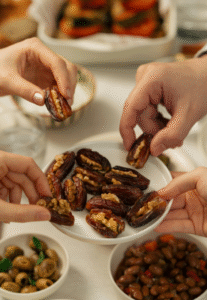Librarians as Cultural Stewards: Preserving Iftar Traditions Through Storytelling
Librarians as Cultural Stewards: Preserving Iftar Traditions Through Storytelling
Shaharima Parvin
Raiyan Bin Reza
It begins quietly.
Almost time for maghrib.
Imagine, in a public library, wedged between markets in Old Dhaka, someone dims the lights. Outside, the smells of piyaju and jilapi weave amongst the call to prayer. Inside, the stories wait.
Yes, libraries. They’re not just book-places any longer. They can be changed. Especially during Ramadan. Especially in Bangladesh, librarians can step into roles that no one ever imagined. Not only information custodians. Cultural custodians too.
—Outside, the smells of piyaju and jilapi weave amongst the call to prayer. Inside, the stories wait.—
Iftar as Intangible Cultural Heritage
In 2023, the UN cultural agency recognised iftar, the meal that breaks the daytime fast during the Muslim holy month of Ramadan, by adding it to its intangible cultural heritage list. Food is culture. It is memory and migration, homeland and exile, tradition and adaptation. Iftar is much more than food. It is a time of symbolism, memory and community. In Bangladesh, for example, a typical iftar might include piyaju (lentil fritters), begguni (eggplant paste), chhola (five-spice chickpeas), puffed rice, dates, and local fruits (Hossain, 2018). These foods are more than just culinary choices; they are cultural texts, each with historical and regional significance. In urban societies, many traditions are changing or disappearing. The pressures of modern life – migration, economic transition, climate change – have changed the way people celebrate Ramadan. Preserving Iftar traditions is therefore not only an act of nostalgia but also a means of cultural rehabilitation.

Librarians as Cultural Custodians
You know those iftar dishes? The ones your nanu (grandmother) just makes. No measuring. A pinch of this. A handful of that. Recipes never written down. Spoken and passed mouth to mouth. That is heritage. That is memory. It is being lost. Librarians? They are catching it before it gets lost. During Ramadan, many libraries, for example, the Central Public Library in Shahbagh, hosts a Doa and Iftar Mahfil. Beyond this formal gathering, this library can take initiative to foster connection through shared stories. Often called “people’s universities,” public libraries are open to all citizens. Just imagine sharing memories not just of faith, food of family, but also of resilience and new beginnings. Someone’s memory of breaking fast in a refugee camp in ’71. Someone else’s memory of their first Ramadan in a new city – Chuadanga, Dinajpur, even Oslo.
It is not always formal. Sometimes a librarian is just there to listen. To document. Or write things on little cards. That way someone’s father used to insist he break fast with just dates and salt water. The exact words spoken before they broke the fast. By creating space for these personal narratives, libraries can truly fulfill their role as community hubs, preserving personal histories and fostering deeper understanding among all people.
Storytelling as a Social Bridge
Librarians can create intergenerational and interfaith dialogue through storytelling experiences that revolve around the question: “What does iftar mean to you?” And what they learn is always rich, layered, and multifaceted. A Rohingya refugee may describe communal iftars in the Cox’s Bazar camps, where the experience of poverty crystallized the meaning of generosity. A university student in Dhaka may recall sharing iftar boxes with street children during the lockdowns of Covid. These narratives highlight not only the manifold ways experiences and lived realities can differ, but the common principles of compassion, patience, and faith that are embodied during Ramadan. In many community library cases, these programs aim to include non-Muslim participants, to develop a taste of cross-cultural understanding and help to eradicate stereotypes. Stories come out when plates are full. In some towns in Bangladesh, informal gatherings, at libraries or adjacent to mosques, evolve to spaces for storytelling during Ramadan. Not just Muslims came, neighbors attended. Hindus, Christians, Buddhists. Everybody knows the anxious anticipation of waiting for the sunset. Everybody has food memories. And all of a sudden, this old building with dusty book shelves feels alive. The library becomes a center of compassion and respect as it creates a space for learning across cultures.
But It is Not Simple
People are on the fence. For some, it’s, “Why would I say that in a library?” Others are concerned “Will my words change?” Trust is the most important thing. Librarians have to slow down in this case. Listen more. Learn from the community. These stories are sacred. Personal. Not meant for show. So, the work is always on holding space, not taking space. Sometimes it is no video. Sometimes it is just audio. Or a note written in Bangla on lined paper. That is fine. And technology? Digital stories can be amazing, immersive sounds, even virtual reality (VR). But not everyone needs buzz words. When it’s a grandma telling stories to a librarian filling a notebook, that is enough. That is preservation.
Digital storytelling has transformed into a means of conserving and disseminating a cultural heritage. Using advanced technology, cultural heritage institutions can develop captivating stories which do not only record but also animate different pieces and traditions. These organizations can apply VR as well as 360° video, which are both revolutionizing the preservation and experience of intangible cultural heritage. Projects such as ‘Mostar Bridge Diving Tradition’ in Bosnia and Herzegovina shows VR can develop immersion and user engagement understanding (Selmanovic et al 2018). Preserving religious traditions in public archives requires thoughtful consideration. Not all community members are willing to share sacred practices publicly. There is a risk of distortion, misappropriation, or commercialization. To address this, librarians use a community-centered documentation model that allows participants to retain rights to their own stories. They also engage in co-curation, involving cultural leaders in the design of programs and platforms. These efforts challenge traditional archival frameworks and call for more inclusive and dynamic approaches to knowledge management.
Sacred Work
Librarians don’t stand out. They don’t need to be the center of attention. But in the quiet corners of Dhaka, Kushtia, and Kolkata, they too are engaged in sacred work. Preserving space for memories. Capturing the whispers of a generation before they fade.
Not perfect. Not glossy. But honest.
That’s what makes it real.
By preserving the traditions of Iftar, librarians play the role of cultural stewards, spiritual witnesses, and bridge builders.
Reference
Selmanovic, E., Rizvić, S., Harvey, C., Boskovic, D., Hulusic, V., Chahin, M., & Sljivo, S. (2018, 12-15 November). VR video storytelling for intangible cultural heritage preservation. The 16th Eurographics Workshop on Graphics and Cultural Heritage, Vienna, Austria. https://doi.org/10.2312/gch.20181341.
Cite this article in APA as: Parvin, S. & Reza, R. B. (2025, July 15). Librarians as cultural stewards: Preserving Iftar traditions through storytelling. Information Matters. https://informationmatters.org/2025/07/librarians-as-cultural-stewards-preserving-iftar-traditions-through-storytelling/
Author
-
Shaharima Parvin is a Senior Assistant Librarian at East West University, Dhaka, Bangladesh, with over a decade of experience in information science and library management. She actively engages in initiatives to promote trustworthy scholarly communication, including advocating for open access, supporting researchers in identifying credible journals, and encouraging the critical evaluation of research literature. She thrives on collaboration, welcomes new challenges, and is dedicated to fostering innovative approaches to knowledge sharing.
View all posts Senior Assistant Librarian





